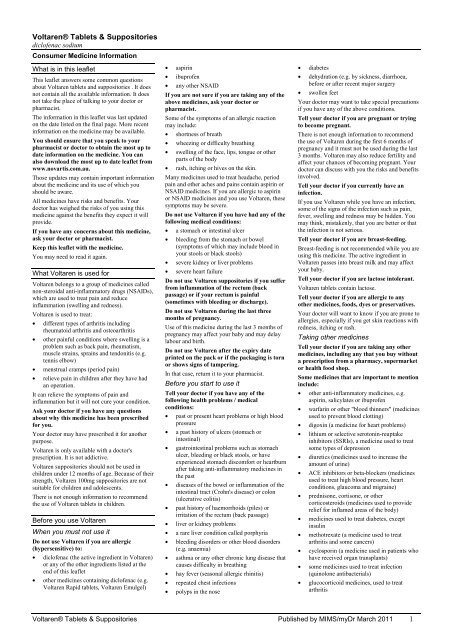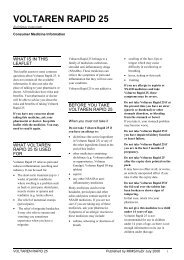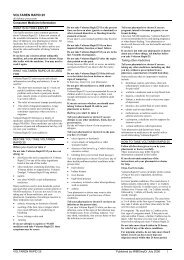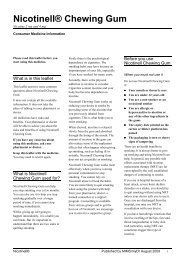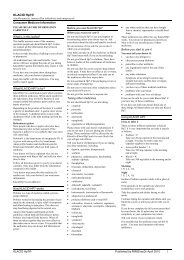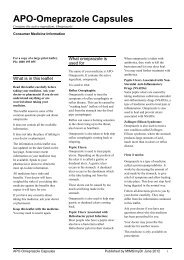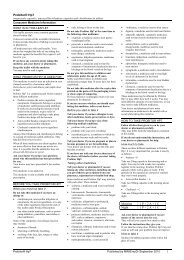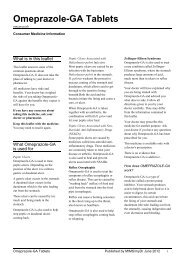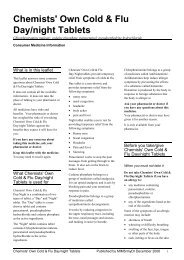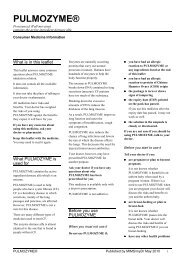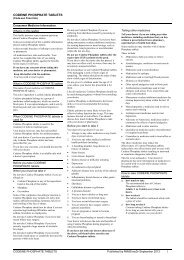Voltaren® Tablets & Suppositories 1 - MyDr
Voltaren® Tablets & Suppositories 1 - MyDr
Voltaren® Tablets & Suppositories 1 - MyDr
You also want an ePaper? Increase the reach of your titles
YUMPU automatically turns print PDFs into web optimized ePapers that Google loves.
<strong>Voltaren®</strong> <strong>Tablets</strong> & <strong>Suppositories</strong><br />
diclofenac sodium<br />
Consumer Medicine Information<br />
What is in this leaflet<br />
This leaflet answers some common questions<br />
about Voltaren tablets and suppositories . It does<br />
not contain all the available information. It does<br />
not take the place of talking to your doctor or<br />
pharmacist.<br />
The information in this leaflet was last updated<br />
on the date listed on the final page. More recent<br />
information on the medicine may be available.<br />
You should ensure that you speak to your<br />
pharmacist or doctor to obtain the most up to<br />
date information on the medicine. You can<br />
also download the most up to date leaflet from<br />
www.novartis.com.au.<br />
Those updates may contain important information<br />
about the medicine and its use of which you<br />
should be aware.<br />
All medicines have risks and benefits. Your<br />
doctor has weighed the risks of you using this<br />
medicine against the benefits they expect it will<br />
provide.<br />
If you have any concerns about this medicine,<br />
ask your doctor or pharmacist.<br />
Keep this leaflet with the medicine.<br />
You may need to read it again.<br />
What Voltaren is used for<br />
Voltaren belongs to a group of medicines called<br />
non-steroidal anti-inflammatory drugs (NSAIDs),<br />
which are used to treat pain and reduce<br />
inflammation (swelling and redness).<br />
Voltaren is used to treat:<br />
• different types of arthritis including<br />
rheumatoid arthritis and osteoarthritis<br />
• other painful conditions where swelling is a<br />
problem such as back pain, rheumatism,<br />
muscle strains, sprains and tendonitis (e.g.<br />
tennis elbow)<br />
• menstrual cramps (period pain)<br />
• relieve pain in children after they have had<br />
an operation.<br />
It can relieve the symptoms of pain and<br />
inflammation but it will not cure your condition.<br />
Ask your doctor if you have any questions<br />
about why this medicine has been prescribed<br />
for you.<br />
Your doctor may have prescribed it for another<br />
purpose.<br />
Voltaren is only available with a doctor's<br />
prescription. It is not addictive.<br />
Voltaren suppositories should not be used in<br />
children under 12 months of age. Because of their<br />
strength, Voltaren 100mg suppositories are not<br />
suitable for children and adolescents.<br />
There is not enough information to recommend<br />
the use of Voltaren tablets in children.<br />
Before you use Voltaren<br />
When you must not use it<br />
Do not use Voltaren if you are allergic<br />
(hypersensitive) to:<br />
• diclofenac (the active ingredient in Voltaren)<br />
or any of the other ingredients listed at the<br />
end of this leaflet<br />
• other medicines containing diclofenac (e.g.<br />
Voltaren Rapid tablets, Voltaren Emulgel)<br />
• aspirin<br />
• ibuprofen<br />
• any other NSAID<br />
If you are not sure if you are taking any of the<br />
above medicines, ask your doctor or<br />
pharmacist.<br />
Some of the symptoms of an allergic reaction<br />
may include:<br />
• shortness of breath<br />
• wheezing or difficulty breathing<br />
• swelling of the face, lips, tongue or other<br />
parts of the body<br />
• rash, itching or hives on the skin.<br />
Many medicines used to treat headache, period<br />
pain and other aches and pains contain aspirin or<br />
NSAID medicines. If you are allergic to aspirin<br />
or NSAID medicines and you use Voltaren, these<br />
symptoms may be severe.<br />
Do not use Voltaren if you have had any of the<br />
following medical conditions:<br />
• a stomach or intestinal ulcer<br />
• bleeding from the stomach or bowel<br />
(symptoms of which may include blood in<br />
your stools or black stools)<br />
• severe kidney or liver problems<br />
• severe heart failure<br />
Do not use Voltaren suppositories if you suffer<br />
from inflammation of the rectum (back<br />
passage) or if your rectum is painful<br />
(sometimes with bleeding or discharge).<br />
Do not use Voltaren during the last three<br />
months of pregnancy.<br />
Use of this medicine during the last 3 months of<br />
pregnancy may affect your baby and may delay<br />
labour and birth.<br />
Do not use Voltaren after the expiry date<br />
printed on the pack or if the packaging is torn<br />
or shows signs of tampering.<br />
In that case, return it to your pharmacist.<br />
Before you start to use it<br />
Tell your doctor if you have any of the<br />
following health problems / medical<br />
conditions:<br />
• past or present heart problems or high blood<br />
pressure<br />
• a past history of ulcers (stomach or<br />
intestinal)<br />
• gastrointestinal problems such as stomach<br />
ulcer, bleeding or black stools, or have<br />
experienced stomach discomfort or heartburn<br />
after taking anti-inflammatory medicines in<br />
the past<br />
• diseases of the bowel or inflammation of the<br />
intestinal tract (Crohn's disease) or colon<br />
(ulcerative colitis)<br />
• past history of haemorrhoids (piles) or<br />
irritation of the rectum (back passage)<br />
• liver or kidney problems<br />
• a rare liver condition called porphyria<br />
• bleeding disorders or other blood disorders<br />
(e.g. anaemia)<br />
• asthma or any other chronic lung disease that<br />
causes difficulty in breathing<br />
• hay fever (seasonal allergic rhinitis)<br />
• repeated chest infections<br />
• polyps in the nose<br />
• diabetes<br />
• dehydration (e.g. by sickness, diarrhoea,<br />
before or after recent major surgery<br />
• swollen feet<br />
Your doctor may want to take special precautions<br />
if you have any of the above conditions.<br />
Tell your doctor if you are pregnant or trying<br />
to become pregnant.<br />
There is not enough information to recommend<br />
the use of Voltaren during the first 6 months of<br />
pregnancy and it must not be used during the last<br />
3 months. Voltaren may also reduce fertility and<br />
affect your chances of becoming pregnant. Your<br />
doctor can discuss with you the risks and benefits<br />
involved.<br />
Tell your doctor if you currently have an<br />
infection.<br />
If you use Voltaren while you have an infection,<br />
some of the signs of the infection such as pain,<br />
fever, swelling and redness may be hidden. You<br />
may think, mistakenly, that you are better or that<br />
the infection is not serious.<br />
Tell your doctor if you are breast-feeding.<br />
Breast-feeding is not recommended while you are<br />
using this medicine. The active ingredient in<br />
Voltaren passes into breast milk and may affect<br />
your baby.<br />
Tell your doctor if you are lactose intolerant.<br />
Voltaren tablets contain lactose.<br />
Tell your doctor if you are allergic to any<br />
other medicines, foods, dyes or preservatives.<br />
Your doctor will want to know if you are prone to<br />
allergies, especially if you get skin reactions with<br />
redness, itching or rash.<br />
Taking other medicines<br />
Tell your doctor if you are taking any other<br />
medicines, including any that you buy without<br />
a prescription from a pharmacy, supermarket<br />
or health food shop.<br />
Some medicines that are important to mention<br />
include:<br />
• other anti-inflammatory medicines, e.g.<br />
aspirin, salicylates or ibuprofen<br />
• warfarin or other "blood thinners" (medicines<br />
used to prevent blood clotting)<br />
• digoxin (a medicine for heart problems)<br />
• lithium or selective serotonin-reuptake<br />
inhibitors (SSRIs), a medicine used to treat<br />
some types of depression<br />
• diuretics (medicines used to increase the<br />
amount of urine)<br />
• ACE inhibitors or beta-blockers (medicines<br />
used to treat high blood pressure, heart<br />
conditions, glaucoma and migraine)<br />
• prednisone, cortisone, or other<br />
corticosteroids (medicines used to provide<br />
relief for inflamed areas of the body)<br />
• medicines used to treat diabetes, except<br />
insulin<br />
• methotrexate (a medicine used to treat<br />
arthritis and some cancers)<br />
• cyclosporin (a medicine used in patients who<br />
have received organ transplants)<br />
• some medicines used to treat infection<br />
(quinolone antibacterials)<br />
• glucocorticoid medicines, used to treat<br />
arthritis<br />
<strong>Voltaren®</strong> <strong>Tablets</strong> & <strong>Suppositories</strong> Published by MIMS/myDr March 2011 1
• sulfinpyrazone (a medicine used to treat<br />
gout)<br />
• voriconazole (a medicine used to treat fungal<br />
infections).<br />
• phenytoin (a medicine used to treat seizures).<br />
You may need to take different amounts of your<br />
medicines or to take different medicines while<br />
you are using Voltaren. Your doctor and<br />
pharmacist have more information.<br />
If you have not told your doctor about any of<br />
these things, tell him/her before you start using<br />
this medicine.<br />
How to use Voltaren<br />
When to take it<br />
Voltaren <strong>Tablets</strong><br />
It is recommended to take the tablets before<br />
meals or on an empty stomach. If they upset<br />
your stomach, you can take them with food or<br />
immediately after food.<br />
They will work more quickly if you take them on<br />
an empty stomach but they will still work if you<br />
have to take them with food to prevent stomach<br />
upset.<br />
Voltaren suppositories<br />
Use the suppositories at bedtime to relieve pain<br />
during the night and early morning stiffness; or to<br />
relieve pain after an operation.<br />
How much Voltaren to take/use<br />
Follow all directions given to you by your<br />
doctor and pharmacist carefully.<br />
These instructions may differ from the<br />
information contained in this leaflet.<br />
If you do not understand the instructions on<br />
the label, ask your doctor or pharmacist for<br />
help.<br />
There are different ways to take Voltaren tablets<br />
and suppositories, depending on your condition.<br />
Your doctor will tell you exactly how many<br />
tablets or suppositories to take.<br />
Do not exceed the recommended dose.<br />
To treat arthritis or other painful<br />
conditions<br />
The usual starting dose of Voltaren tablets is<br />
75mg to 150mg each day. After the early stages<br />
of treatment, it is usually possible to reduce the<br />
dose to 75mg to 100mg each day.<br />
To treat menstrual cramps (period pain)<br />
The tablets are usually taken during each period<br />
as soon as cramps begin and continued for a few<br />
days until the pain goes away.<br />
The usual starting dose of Voltaren tablets is<br />
50mg to 100mg each day, beginning as soon as<br />
cramps begin and continuing until the pain goes<br />
away, but for no longer than 3 days.<br />
If necessary, the dose can be raised over several<br />
menstrual periods to a maximum of 200mg each<br />
day.<br />
To treat post-operative pain in children<br />
Your doctor will advise what strength and dose of<br />
Voltaren suppositories is suitable for your child.<br />
How to take the tablets<br />
Voltaren tablets are usually taken in 2 or 3 doses<br />
during the day.<br />
Swallow the tablets whole with a full glass of<br />
water or other liquid. Do not chew them.<br />
The tablets have a special coating to keep them<br />
from dissolving until they have passed through<br />
the stomach into the bowel. Chewing the tablets<br />
would destroy the coating.<br />
How to use Voltaren suppositories<br />
Do not take suppositories by mouth.<br />
When used in children, the strength of the<br />
Voltaren suppository used depends on the weight<br />
of the child. Your doctor will decide which<br />
strength is suitable for your child and how often it<br />
can be used.<br />
If possible, go to the toilet and empty your<br />
bowels before using the suppository.<br />
Follow these steps:<br />
1. Wash your hands thoroughly with soap and<br />
water.<br />
2. If the suppository feels soft, chill it before<br />
removing the wrapper by placing it in the<br />
fridge or holding it under cold water for a<br />
few minutes.<br />
3. Put on a disposable glove, if desired<br />
(available from a pharmacy).<br />
4. Remove the entire wrapper from the<br />
suppository.<br />
5. Moisten the suppository by dipping it briefly<br />
in cool water.<br />
6. Lie on your side and raise your knees to your<br />
chest.<br />
7. Push the suppository, blunt end first, gently<br />
into your rectum (back passage). Do not<br />
break the suppository.<br />
8. Remain lying down for a few minutes so that<br />
the suppository dissolves.<br />
9. Wash your hands again thoroughly.<br />
Try not to go to the toilet to empty your bowels<br />
for at least one hour after using the<br />
suppository.<br />
If you are not sure how to use a suppository,<br />
ask your pharmacist or doctor.<br />
How long to take/use it<br />
Do not use Voltaren for longer than your<br />
doctor says.<br />
If you are using Voltaren for arthritis, it will not<br />
cure your disease but it should help to control<br />
pain and inflammation. It usually begins to work<br />
within a few hours but several weeks may pass<br />
before you feel the full effects of the medicine.<br />
Voltaren suppositories should not be used for<br />
more than 3 days in children.<br />
If you forget to take/use it<br />
If it is almost time for your next dose (e.g.<br />
within 2 or 3 hours), skip the dose you missed<br />
and take the next dose when you are meant to.<br />
Otherwise, take it as soon as you remember,<br />
and then go back to taking it as you would<br />
normally.<br />
Do not take a double dose to make up for the<br />
one that you missed.<br />
This may increase the chance of you getting an<br />
unwanted side effect.<br />
If you have trouble remembering when to take<br />
your medicine, ask your pharmacist for some<br />
hints.<br />
If you take/use too much Voltaren<br />
(Overdose)<br />
Immediately telephone your doctor or Poisons<br />
Information Centre (telephone 13 11 26), or<br />
go to Accident and Emergency at your nearest<br />
hospital if you think that you or anyone else<br />
may have used too much Voltaren. Do this<br />
even if there are no signs of discomfort or<br />
poisoning. Keep the telephone numbers for<br />
these places handy.<br />
If you take too much Voltaren, you may<br />
experience:<br />
• vomiting<br />
• bleeding from the stomach or bowel<br />
• diarrhoea<br />
• dizziness<br />
• ringing in the ears<br />
• convulsions (fits)<br />
While you are taking/ using Voltaren<br />
Things you must do<br />
If you take Voltaren for more than a few<br />
weeks, you should make sure to visit your<br />
doctor for regular check-ups to ensure that<br />
you are not suffering from unnoticed<br />
undesirable effects.<br />
If you become pregnant whilst taking or using<br />
Voltaren, tell your doctor immediately.<br />
Your doctor can discuss with you the risks of<br />
using it while you are pregnant.<br />
Be sure to keep all of your doctor's<br />
appointments so that your progress can be<br />
checked.<br />
Your doctor may want to check your kidneys,<br />
liver and blood from time to time to help prevent<br />
unwanted side effects.<br />
If you are going to have surgery, make sure<br />
the surgeon and anaesthetist know that you<br />
are using Voltaren.<br />
NSAID medicines can slow down blood clotting<br />
and affect kidney function.<br />
If you get an infection while using Voltaren,<br />
tell your doctor.<br />
This medicine may hide some of the signs of an<br />
infection (pain, fever, swelling, redness). You<br />
may think, mistakenly, that you are better or that<br />
the infection is not serious.<br />
If you are about to be started on any new<br />
medicine, remind your doctor and pharmacist<br />
that you are using Voltaren.<br />
Tell any other doctor, dentist or pharmacist<br />
who treats you that you are using Voltaren.<br />
Things you must not do<br />
Do not take any of the following medicines<br />
while you are using Voltaren without first<br />
telling your doctor:<br />
• aspirin (also called ASA or acetylsalicylic<br />
acid)<br />
• other salicylates<br />
• other medicines containing diclofenac (e.g.<br />
Voltaren Rapid tablets, Voltaren Emulgel)<br />
• ibuprofen<br />
• any other NSAID medicine<br />
If you take these medicines together with<br />
Voltaren, they may cause unwanted side effects.<br />
If you need to take something for headache or<br />
fever, it is usually okay to take paracetamol. If<br />
you are not sure, your doctor or pharmacist can<br />
advise you.<br />
Do not stop any other forms of treatment for<br />
arthritis that your doctor has told you to<br />
follow.<br />
This medicine does not replace exercise or rest<br />
programs or the use of heat/cold treatments.<br />
Do not give this medicine to anyone else, even<br />
if their condition seems similar to yours.<br />
Do not use it to treat any other complaints<br />
unless your doctor tells you to.<br />
<strong>Voltaren®</strong> <strong>Tablets</strong> & <strong>Suppositories</strong> Published by MIMS/myDr March 2011 2
Things to be careful of<br />
Be careful driving, operating machinery or<br />
doing jobs that require you to be alert until<br />
you know how Voltaren affects you.<br />
This medicine may cause dizziness, drowsiness,<br />
spinning sensation (vertigo) or blurred vision in<br />
some people. If you have any of these symptoms,<br />
do not drive, use machines, or do anything else<br />
that could be dangerous.<br />
Elderly patients should take the minimum<br />
number of tablets or suppositories that<br />
provides relief of symptoms.<br />
Elderly patients may be more sensitive to the<br />
effects of Voltaren than other adults.<br />
Side effects<br />
Tell your doctor or pharmacist as soon as<br />
possible if you do not feel well while you are<br />
using Voltaren.<br />
All medicines can have side effects. Sometimes<br />
they are serious, most of the time they are not.<br />
You may need medical treatment if you get some<br />
of the side effects.<br />
If you are over 65 years old, you should be<br />
especially careful while taking this medicine.<br />
Report any side effects promptly to your<br />
doctor.<br />
As people grow older, they are more likely to get<br />
side effects from medicines.<br />
Do not be alarmed by these lists of possible<br />
side effects. You may not experience any of<br />
them.<br />
Ask your doctor or pharmacist to answer any<br />
questions you may have.<br />
Tell your doctor if you notice any of the<br />
following and they worry you:<br />
• stomach upset including nausea (feeling<br />
sick), vomiting, indigestion, cramps, loss of<br />
appetite, wind<br />
• heartburn or pain behind or below the<br />
breastbone (possible symptoms of an ulcer in<br />
the tube that carries food from the throat to<br />
the stomach)<br />
• stomach or abdominal pain<br />
• constipation, diarrhoea<br />
• sore mouth or tongue<br />
• altered taste sensation<br />
• headache<br />
• dizziness, spinning sensation<br />
• drowsiness, disorientation, forgetfulness<br />
• feeling depressed, anxious or irritable<br />
• strange or disturbing thoughts or moods<br />
• shakiness, sleeplessness, nightmares<br />
• tingling or numbness of the hands or feet<br />
• feeling of fast or irregular heart beat<br />
• unusual weight gain or swelling of arms,<br />
hands, feet, ankles or legs due to fluid<br />
buildup<br />
• symptoms of sunburn (such as redness,<br />
itching, swelling, blistering of the lips, eyes,<br />
mouth, and/or skin) that happen more<br />
quickly than normal<br />
• skin inflammation with flaking or peeling<br />
• vision disorders (e.g. blurred or double<br />
vision)<br />
• buzzing or ringing in the ears, difficulty<br />
hearing<br />
• hypertension (high blood pressure)<br />
• hair loss or thinning<br />
• application site irritation, painful rectum or<br />
discomfort in the rectum (back passage) or<br />
worsening of haemorrhoids (piles) when<br />
using the suppositories<br />
If any of the following signs appear, tell your<br />
doctor immediately or go to Accident and<br />
Emergency at your nearest hospital:<br />
• red or purple skin (possible signs of blood<br />
vessel inflammation)<br />
• severe pain or tenderness in the stomach,<br />
vomiting blood or material that looks like<br />
coffee grounds, bleeding from the back<br />
passage, black sticky bowel motions (stools)<br />
or bloody diarrhoea (possible stomach<br />
problems)<br />
• rash, skin rash with blisters, itching or hives<br />
on the skin; swelling of the face, lips, mouth,<br />
tongue, throat, or other part of the body<br />
which may cause difficulty to swallow, low<br />
blood pressure (hypotension), fainting,<br />
shortness of breath (possible allergic<br />
reaction)<br />
• wheezing, troubled breathing, or feelings of<br />
tightness in the chest (signs of asthma)<br />
• yellowing of the skin and/or eyes (signs of<br />
hepatitis/liver failure)<br />
• persistent nausea, loss of appetite, unusual<br />
tiredness, vomiting, pain in the upper right<br />
abdomen, dark urine or pale bowel motions<br />
(possible liver problems)<br />
• constant "flu-like" symptoms including<br />
chills, fever, sore throat, aching joints,<br />
swollen glands, tiredness or lack of energy,<br />
bleeding or bruising more easily than normal<br />
(possible blood problem)<br />
• painful red areas, large blisters, peeling of<br />
layers of skin, bleeding in the lips, eyes,<br />
mouth, nose or genitals, which may be<br />
accompanied by fever and chills, aching<br />
muscles and feeling generally unwell<br />
(possible serious skin reaction)<br />
• signs of a possible effect on the brain, such<br />
as sudden and severe headache, stiff neck<br />
(signs of viral meningitis), severe nausea,<br />
dizziness, numbness, difficulty in speaking,<br />
paralysis (signs of cerebral attack),<br />
convulsions (fits)<br />
• change in the colour or amount of urine<br />
passed, frequent need to urinate, burning<br />
feeling when passing urine, blood or excess<br />
of protein in the urine (possible kidney<br />
disorders)<br />
• chest pain (which may be a sign of a heart<br />
attack)<br />
Tell your doctor if you notice anything else<br />
that is making you feel unwell.<br />
Some people may have other side effects not yet<br />
known or mentioned in this leaflet.<br />
After using Voltaren<br />
Storage<br />
• Keep your medicine in the original container<br />
until it is time to use it.<br />
• Store it in a cool dry place.<br />
• Do not store Voltaren or any other medicine<br />
in the bathroom or near a sink.<br />
• Do not leave it in the car or on window sills.<br />
Keep the medicine where children cannot<br />
reach it.<br />
A locked cupboard at least one-and-a-half metres<br />
above the ground is a good place to store<br />
medicines.<br />
Disposal<br />
If your doctor tells you to stop using Voltaren<br />
or the expiry date has passed, ask your<br />
pharmacist what to do with any medicine you<br />
have left over.<br />
Product description<br />
What it looks like<br />
Voltaren tablets<br />
Voltaren 25mg tablets are round, yellow, coated<br />
tablets marked "CG" on one side and "BZ" on the<br />
other side; blisters of 50.<br />
Voltaren 50mg tablets are round, pale brown,<br />
coated tablets marked "CG" on one side and "GT"<br />
on the other side; blisters of 50.<br />
Voltaren suppositories<br />
Voltaren suppositories are yellowish-white,<br />
torpedo shaped suppositories. The 100mg<br />
strength are in packs of 20 and the lower strength<br />
suppositories are in packs of 10.<br />
Ingredients<br />
Voltaren tablets<br />
contain 25mg or 50mg diclofenac sodium as the<br />
active ingredient in gastro-resistant tablets.<br />
The tablets also contain:<br />
• silica colloidal anhydrous<br />
• microcrystalline cellulose (E460)<br />
• lactose<br />
• magnesium stearate (E572)<br />
• maize starch<br />
• povidone (E1201)<br />
• hypromellose (E463)<br />
• iron oxide yellow CI77492 (E172)<br />
• iron oxide red CI77491 (50mg tablet only)<br />
(E172)<br />
• titanium dioxide (E171)<br />
• sodium starch glycollate<br />
• purified talc (E553b)<br />
• macrogol 8000<br />
• PEG-40 hydrogenated castor oil<br />
• acrylates copolymer<br />
Voltaren tablets do not contain sucrose, gluten,<br />
tartrazine or any other azo dyes .<br />
Voltaren suppositories<br />
contain either 12.5mg, 25mg, 50mg or 100mg<br />
diclofenac sodium as the active ingredient in a<br />
triglyceride base.<br />
Voltaren suppositories do not contain lactose,<br />
sucrose, gluten, tartrazine or any other azo dyes .<br />
Sponsor<br />
Voltaren is supplied in Australia by:<br />
NOVARTIS Pharmaceuticals Australia Pty<br />
Limited<br />
ABN 18 004 244 160<br />
54 Waterloo Road<br />
North Ryde NSW 2113<br />
Telephone: 1800 671 203<br />
®= Registered Trademark<br />
This leaflet was prepared on 10 December 2010<br />
Australian Registration Numbers:<br />
25mg tablet blister AUST R 166496<br />
50mg tablet blister AUST R 66880<br />
12.5mg suppository AUST R 96797<br />
25mg suppository AUST R 96810<br />
50mg suppository AUST R 96811<br />
100mg suppository AUST R 37582<br />
<strong>Voltaren®</strong> <strong>Tablets</strong> & <strong>Suppositories</strong> Published by MIMS/myDr March 2011 3


